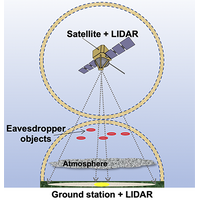ML4Q associated member and Independence Grant Fellow, Frederico Grasselli (Bruss group, HHU Düsseldorf) co-authored a paper which was published on November 1st in PRX Quantum.
In the joint work, the authors explore the security of discrete- and continuous-variable QKD protocols in restricted eavesdropping scenarios and in the presence of bypass channels. These scenarios are particularly suited to Satellite-based QKD.
Abstract:
Quantum communications allows individual users to securely exchange data with minimal assumptions on the computational power of potential eavesdroppers. Being based on fundamental physical systems, such as photons, quantum secure protocols often suffer from loss in the transmission channel and, hence, are limited in the distance scales they can cover. Fortunately, progress with satellite systems can help with this issue. We look at the security assumptions that are relevant where quantum protocols are implemented via spaceborne systems and speculate how their performance can be improved under realistic conditions.
One of the key assumptions in quantum secure protocols is that the entire channel is assumed to be controlled by an eavesdropper. The protocol is then designed in such a way that, on the basis of the transmitted signals and the measurement results obtained, the two legitimate users can bound the amount of information that may have leaked to the eavesdropper. In satellite-based quantum communications, one may argue that this main assumption is a bit too conservative, and it might be of practical interest to loosen it a bit and see how system performance is improved. This is the key motivation for our work, in which some restrictions are imposed on potential eavesdroppers. The restrictions we assume have practical relevance in the satellite setting and result in scenarios that are less explored in the field. We provide new generic and customized bounds for the security of the system in these new scenarios. In particular, some protocols that may not be space operational under unrestricted assumptions will become viable solutions in our framework, which makes the uptake of the technology more feasible in the near future.

More details: Satellite-Based Quantum Key Distribution in the Presence of Bypass Channels. Masoud Ghalaii, Sima Bahrani, Carlo Liorni, Federico Grasselli, Hermann Kampermann, Lewis Wooltorton, Rupesh Kumar, Stefano Pirandola, Timothy P. Spiller, Alexander Ling, Bruno Huttner, and Mohsen Razavi. PRX Quantum 4, 040320 – Published 1 November 2023